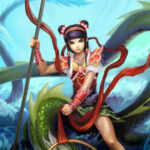Father Figures and Fierce Independence: A Cross-Cultural Examination
The tension between parental authority and a child’s autonomy is a universal theme in storytelling. From the explosive conflict between Li Jing and Nezha in Chinese mythology to the fraught dynamics in Western narratives like Star Wars or King Lear, these stories explore the pain, defiance, and eventual reconciliation (or destruction) that define strained parent-child relationships. This article delves into these parallels, examining how different cultures frame rebellion, duty, and independence.
The Clash of Legacies: Duty vs. Defiance
In Chinese folklore, Nezha’s defiance of his father, Li Jing, arises from a mix of youthful arrogance and a desire to carve his own fate—mirroring the struggles of Western figures like Luke Skywalker or Edmund Pevensie. Nezha’s self-sacrifice and later resurrection highlight the cyclical nature of rebellion and forgiveness, whereas Western narratives often frame the conflict as a battle between good and evil. Both, however, center on a father’s inability to understand his child’s choices, leading to estrangement or tragedy.
The Price of Independence: Redemption or Ruin?
While Nezha’s story ends in reconciliation through divine intervention, many Western tales embrace irreversible consequences. In King Lear, Cordelia’s stubborn integrity leads to her demise, while Darth Vader’s redemption in Star Wars comes too late to undo years of tyranny. These differing resolutions reveal cultural attitudes toward filial piety: Eastern stories often leave room for harmony, while Western ones dwell on irreversible choices.
Conclusion: A Universal Struggle, Contrasting Resolutions
Whether Eastern or Western, myths and literature repeatedly tackle the friction between fathers and defiant children. While the Nezha-Li Jing dynamic illustrates the possibility of redemption within familial bonds, Western narratives often emphasize the tragic costs of pride and inflexibility. Ultimately, both traditions reflect humanity’s enduring struggle between tradition and individuality—offering lenses to examine our own relationships with authority and identity.


